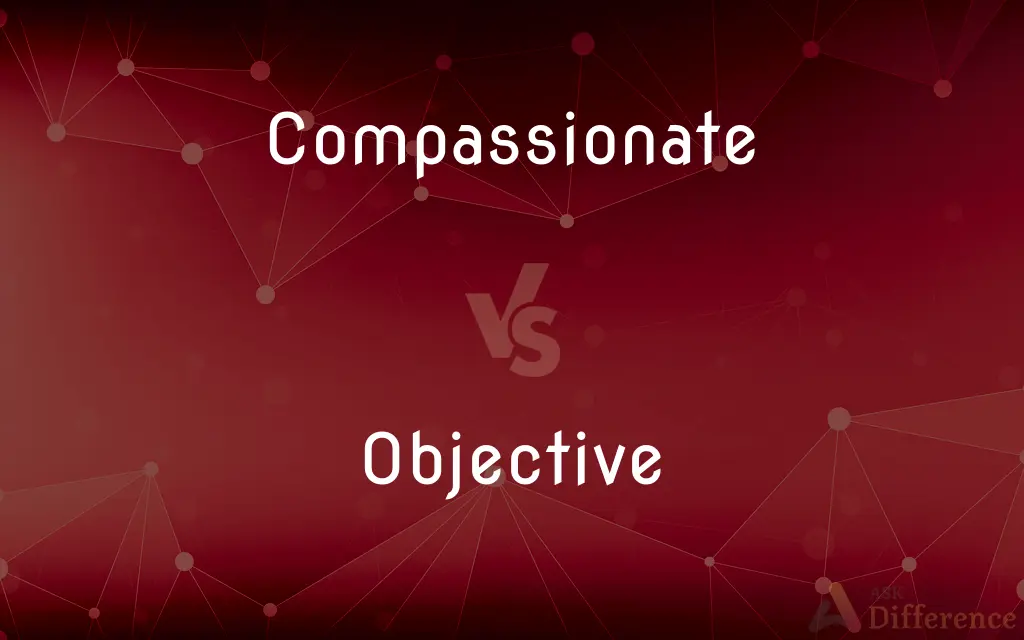Compassionate vs. Objective — What's the Difference?
By Tayyaba Rehman — Published on October 1, 2023
Compassionate involves feeling or showing sympathy and concern for others, while Objective refers to being impartial and not influenced by personal feelings or biases.

Difference Between Compassionate and Objective
Table of Contents
ADVERTISEMENT
Key Differences
Compassionate pertains to the quality of having or showing deep sympathy and concern for others, especially those suffering or in distress. Objective, on the other hand, describes a state of mind where one remains neutral and unaffected by personal feelings, interpretations, or prejudice.
In various situations, being compassionate can lead one to make decisions based on empathy and understanding, even if these decisions are not strictly rational. Being objective, conversely, implies making decisions based on factual evidence and logic, without letting emotions or personal biases cloud judgment.
It's essential to recognize that while compassionate actions are driven by feelings and care for another's well-being, objective actions are driven by neutral evaluation and critical thinking. In some contexts, balancing both can lead to well-rounded decisions.
The world often requires a combination of both compassion and objectivity. A compassionate doctor, for instance, might provide comfort to a grieving family, while also being objective about medical decisions and treatments based on facts and evidence.
In personal relationships, being compassionate helps in understanding and caring for a partner's emotions and needs. In contrast, being objective ensures that decisions made are fair, logical, and not solely driven by emotions.
ADVERTISEMENT
Comparison Chart
Nature
Emotional and empathetic.
Neutral and unbiased.
Driving Factor
Sympathy and concern for others.
Factual evidence and logic.
Application
Personal relationships, counseling, and care professions.
Scientific research, critical analysis, and decision-making.
Outcome
Decisions influenced by feelings and care.
Decisions based on neutral evaluation and critical thinking.
Potential Bias
Can be influenced by emotional attachment.
Aims to eliminate personal bias.
Compare with Definitions
Compassionate
Motivated by a desire to help or alleviate suffering.
Compassionate individuals often volunteer at shelters or hospitals.
Objective
Based on factual and observable phenomena.
The scientist took an objective approach to the experiment.
Compassionate
Exhibiting kindness and understanding.
Her compassionate response to the child's mistake was heartwarming.
Objective
Not influenced by personal feelings or opinions.
Her objective analysis of the situation was appreciated by all.
Compassionate
Feeling or suffering alongside another.
His compassionate nature made him cry during sad movies.
Objective
Unbiased and neutral.
Judges need to remain objective when presiding over a case.
Compassionate
Having a soft heart or being easily moved by the troubles of others.
His compassionate demeanor made him a favorite among his peers.
Objective
Aimed at achieving a specific goal or target.
The objective of the meeting was to finalize the project details.
Compassionate
Showing deep sympathy and concern for others.
She was compassionate towards the homeless man and offered him a meal.
Objective
Existing independent of or external to the mind; actual or real
Objective reality.
Compassionate
Feeling or showing sympathy and concern for others
I allowed him to go home on compassionate grounds
She tried to sound compassionate
Objective
Based on observable phenomena; empirical
Objective facts.
Compassionate
Feeling or showing compassion; sympathetic.
Objective
Uninfluenced by emotions or personal prejudices
An objective critic.
Compassionate
Granted to an individual because of an emergency or other unusual circumstances
Compassionate military leave.
Objective
A thing or group of things existing independent of the mind.
Compassionate
To pity.
Objective
The objective case.
Compassionate
Having, feeling or showing compassion (to or toward someone).
Objective
A noun or pronoun in the objective case.
Compassionate
Given to someone as an exception because of a family emergency or a death in their family.
Compassionate leave; a compassionate visa
Objective
The primary optical element, such as a lens or mirror, in a microscope, camera, telescope, or other optical instrument, that first receives light rays from the object and forms the image. Also called object glass, objective lens, object lens.
Compassionate
(obsolete) Inviting or asking for pity.
Objective
Of or relating to a material object, actual existence or reality.
Compassionate
To feel compassion (for someone or with regard to something); to regard (someone or something) with compassion.
Objective
Not influenced by the emotions or prejudices.
Compassionate
Having a temper or disposition to pity; sympathetic; merciful.
There never was any heart truly great and generous, that was not also tender and compassionate.
Objective
Based on observed facts; without subjective assessment.
Compassionate
Complaining; inviting pity; pitiable.
Objective
(grammar) Of, or relating to a noun or pronoun used as the object of a verb.
Compassionate
To have compassion for; to pity; to commiserate; to sympathize with.
Compassionates my pains, and pities me.
Objective
Of, or relating to verbal conjugation that indicates the object (patient) of an action. In linguistic descriptions of Tundra Nenets, among others.
Compassionate
Share the suffering of
Objective
A material object that physically exists.
Compassionate
Showing merciful compassion;
Sparing the child's mother was a compassionate act
Objective
A goal that is striven for.
Compassionate
Showing or having compassion;
Heard the soft and compassionate voices of women
Objective
(grammar) The objective case.
Compassionate
Showing recognition of unusually distressful circumstances;
Compassionate leave
Considered for a compassionate discharge because of domestic difficulties
Objective
(grammar) a noun or pronoun in the objective case.
Objective
The lens or lenses of a camera, microscope, or other optical device closest to the object being examined.
Objective
Of or pertaining to an object.
Objective
Of or pertaining to an object; contained in, or having the nature or position of, an object; outward; external; extrinsic; - an epithet applied to whatever is exterior to the mind, or which is simply an object of thought or feeling, as opposed to being related to thoughts of feelings, and opposed to subjective.
In the Middle Ages, subject meant substance, and has this sense in Descartes and Spinoza: sometimes, also, in Reid. Subjective is used by William of Occam to denote that which exists independent of mind; objective, what is formed by the mind. This shows what is meant by realitas objectiva in Descartes. Kant and Fichte have inverted the meanings. Subject, with them, is the mind which knows; object, that which is known; subjective, the varying conditions of the knowing mind; objective, that which is in the constant nature of the thing known.
Objective has come to mean that which has independent existence or authority, apart from our experience or thought. Thus, moral law is said to have objective authority, that is, authority belonging to itself, and not drawn from anything in our nature.
Objective
Unbiased; unprejudiced; fair; uninfluenced by personal feelings or personal interests; considering only the facts of a situation unrelated to the observer; - of judgments, opinions, evaluations, conclusions, reasoning processes.
Objective means that which belongs to, or proceeds from, the object known, and not from the subject knowing, and thus denotes what is real, in opposition to that which is ideal - what exists in nature, in contrast to what exists merely in the thought of the individual.
Objective
The objective case.
Objective
The goal intended to be attained (and which is believed to be attainable);
The sole object of her trip was to see her children
Objective
The lens or system of lenses nearest the object being viewed
Objective
Undistorted by emotion or personal bias; based on observable phenomena;
An objective appraisal
Objective evidence
Objective
Serving as or indicating the object of a verb or of certain prepositions and used for certain other purposes;
Objective case
Accusative endings
Objective
Emphasizing or expressing things as perceived without distortion of personal feelings or interpretation;
Objective art
Objective
Belonging to immediate experience of actual things or events;
Concrete benefits
A concrete example
There is no objective evidence of anything of the kind
Objective
Representing external reality without internal influence.
Objective journalism presents facts without taking sides.
Common Curiosities
Can a person be both compassionate and objective?
Yes, in many situations, it's beneficial to balance both compassion and objectivity.
What does it mean to be compassionate?
Being compassionate means showing deep sympathy and concern for others, especially those in distress.
Can objectivity be compromised by personal bias?
Yes, true objectivity seeks to eliminate personal bias, but it can be challenging to achieve absolute neutrality.
Is it always better to be objective?
Not always. Context matters. While objectivity is crucial in scientific research or critical analysis, compassion is vital in personal relationships and care professions.
How can one develop objectivity?
Developing objectivity can involve critical thinking, seeking diverse perspectives, and separating emotions from decisions.
Is compassion a natural emotion?
Yes, compassion is considered a natural and inherent emotion in humans, often triggered by witnessing suffering.
Why is objectivity essential in scientific research?
Objectivity ensures that research findings are based on evidence and facts, rather than personal biases or emotions.
How does being objective differ from being compassionate?
Being objective involves making decisions based on facts and logic, uninfluenced by emotions, while being compassionate is driven by empathy and understanding.
Why is compassion important?
Compassion fosters understanding, builds connections, and can lead to supportive and caring environments.
How does compassion relate to empathy?
Compassion often stems from empathy, which is the ability to understand and feel another's emotions.
In what professions is compassion especially important?
Compassion is especially important in professions like nursing, counseling, social work, and teaching.
Can a decision be both compassionate and objective?
Yes, some decisions can strike a balance between understanding human emotions and relying on factual evidence.
How is objectivity used in journalism?
Objective journalism presents facts without introducing personal biases, opinions, or emotions.
Can being too compassionate lead to challenges?
Excessive compassion, without boundaries, can lead to emotional exhaustion or being taken advantage of.
Share Your Discovery

Previous Comparison
Freud vs. Jung
Next Comparison
Purely vs. SimplyAuthor Spotlight
Written by
Tayyaba RehmanTayyaba Rehman is a distinguished writer, currently serving as a primary contributor to askdifference.com. As a researcher in semantics and etymology, Tayyaba's passion for the complexity of languages and their distinctions has found a perfect home on the platform. Tayyaba delves into the intricacies of language, distinguishing between commonly confused words and phrases, thereby providing clarity for readers worldwide.














































